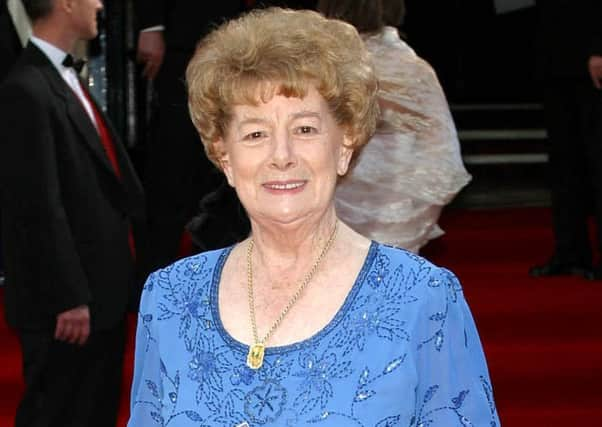Obituary: Jean Alexander, actress


With her mop and pinny, her hair in curlers, partly covered by a head square, and a voice with all the sweetness of chalk on a blackboard, Hilda Ogden was one of the most familiar and best loved characters on British TV.
Jean Alexander made her debut as Hilda Ogden on Coronation Street – or Corrie – in 1964, four years after Granada’s landmark working-class soap opera began. But Hilda was actually Alexander’s second character – she had played a landlady called Mrs Webb on a couple of episodes in 1962.
Advertisement
Hide AdAdvertisement
Hide AdHilda first emerged from beneath the sink in her new house at No 13, enthusing that it had not one, but two taps. Unfortunately, only one worked.
“Hilda’s background is just like mine,” said Alexander, who was born in Liverpool, though her forebears were Scottish. “We were plain Scots Presbyterian, hard-working and church-going,” she said. “We had no fridge, washer, inside toilet or garden. But being poor didn’t do any harm. You just tried to better yourselves.”
Hilda was a cleaner and husband Stan (Bernard Youens) was a window-cleaner, though he was never in any danger of winning the Queen’s award for industry. Hilda had no great intellectual aspirations, but she had old-fashioned values, was houseproud and delighted in her trio of flying ducks and the “muriel” on her living-room wall.
They were later joined by Stan’s friend Eddie Yeats (Geoffrey Hughes), a lovable rogue who became their lodger. They provided much of the humour in the show and audiences loved them. In 1982 Hilda ranked just behind the Queen, Queen Mother and Princess Diana in a poll of the most recognisable women in Britain.
Hilda and Stan bickered constantly, but unusually for a soap, they stayed together. And in 2002, long after their last appearance on the show, the Oggiesbeat characters from Friends in a vote on TV’s most romantic couple.
The death in 1984 of Youens forced the writers to kill off his character. A scene in which the unsentimental Hilda picked up his glasses and burst into tears had cast, crew and audience in tears too and it helped win Alexander a Royal Television Society award for best actor or actress of the year.
Alexander continued for a few years after Youens’s death before deciding it was time to move on. The writers determined that her character would head off to become a doctor’s housekeeper in Derbyshire. Her final episode, in 1987, was the highest rated in the show’s history, drawing an audience of 27 million. She had played Hilda in more than 1,600 episodes.
Several times the producers tried to persuade Alexander to return, but she never did. Instead she played Auntie Wainwright, the hilariously mean and devious shopkeeper, in more than 150 episodes of Last of the Summer Wine between 1988 and 2010. Off-screen Alexander was a rather more demure character than the sharp-tongued gossip she played on Corrie. She was born Jean Hodgkinson in Liverpool in 1926, won a scholarship to a local girls’ school and worked as a librarian for five years before becoming an actress.
Advertisement
Hide AdAdvertisement
Hide AdHer father Archie was an electrician and she took his middle name as a stage name. She worked in provincial theatre in the North of England, as an actress, stage manager and wardrobe mistress.
Coronation Street began in 1960 at a time when a new generation of working-class writers were turning out novels, stories, plays and film scripts, with working-class characters and provincial settings. It was set in the fictional town of Weatherfield, which was based on Salford.
There were two episodes a week and the show needed a regular supply of actors and actresses who were convincing in the milieu. It was not long before the producers were recalling the same actors to play different roles, and after her brief appearance as Mrs Webb in 1962, Alexander was asked back two years later. “I had already had an offer for another series and I asked my agent which part I should take,” she said. “The other one was a five-week series, so she said to go with Coronation Street. So I decided to take it and see what happened.” The role turned into a career.
The character of Hilda was created by the show’s writers, but Alexander claimed credit for her appearance. “I grew up in Liverpool during the Second World War and all the young women who could, worked in the munitions factory in Speke and they all dressed like Hilda did. They would go off to their shift with their pinafores on and their hair up and tied in a headscarf so it didn’t get caught up in the machinery. I never envisaged how iconic she would become, but to be able to make her someone so many people recognised was an honour.”
Alexander had auditioned with Bernard Youens at the outset. She said: “I got on well with Bernard, who had also been in rep where you have to learn your lines quickly and a new play every week.” While part of one of the most famous married couples on British television, Alexander herself never married.
Shortly after leaving Corrie she played Christine Keeler’s mother in Scandal (1989), one of her few film roles. As well as Last of the Summer Wine, she had recurring roles in the sitcoms Rich Tea and Sympathy (1991) and Barbara (2000-02).
Alexander lived modestly in a semi-detached house in Southport, Merseyside, with her mother, and then by herself. In later life she suffered various health problems, including osteoporosis.
In an interview in 2014 she admitted that she rarely watched Corrie anymore and preferred Emmerdale. “We had a lot of fun making Coronation Street and the fans let us know they had fun watching it,” she said. “There were heartbreaking moments but we also tried to make people laugh. Today it’s all sex, doom and gloom and it’s all taken far too seriously.”
BRIAN PENDREIGH